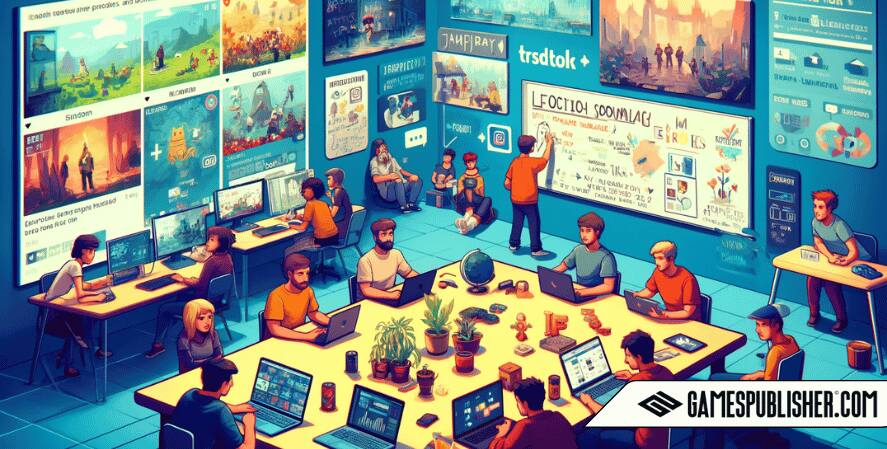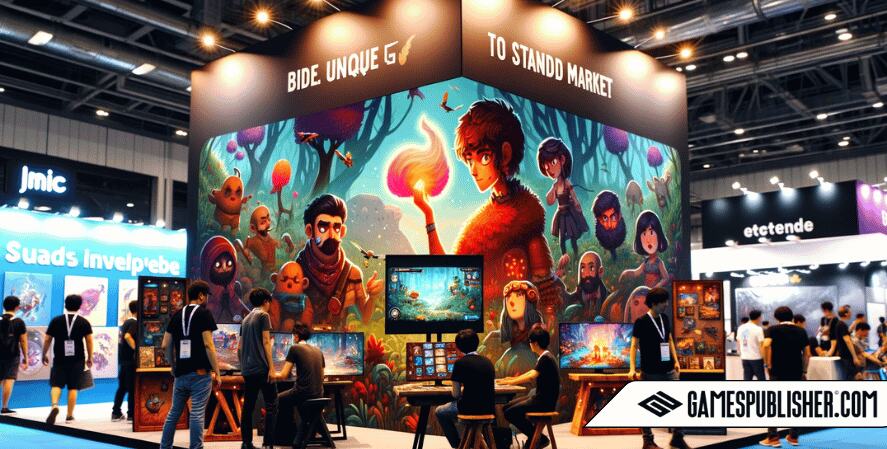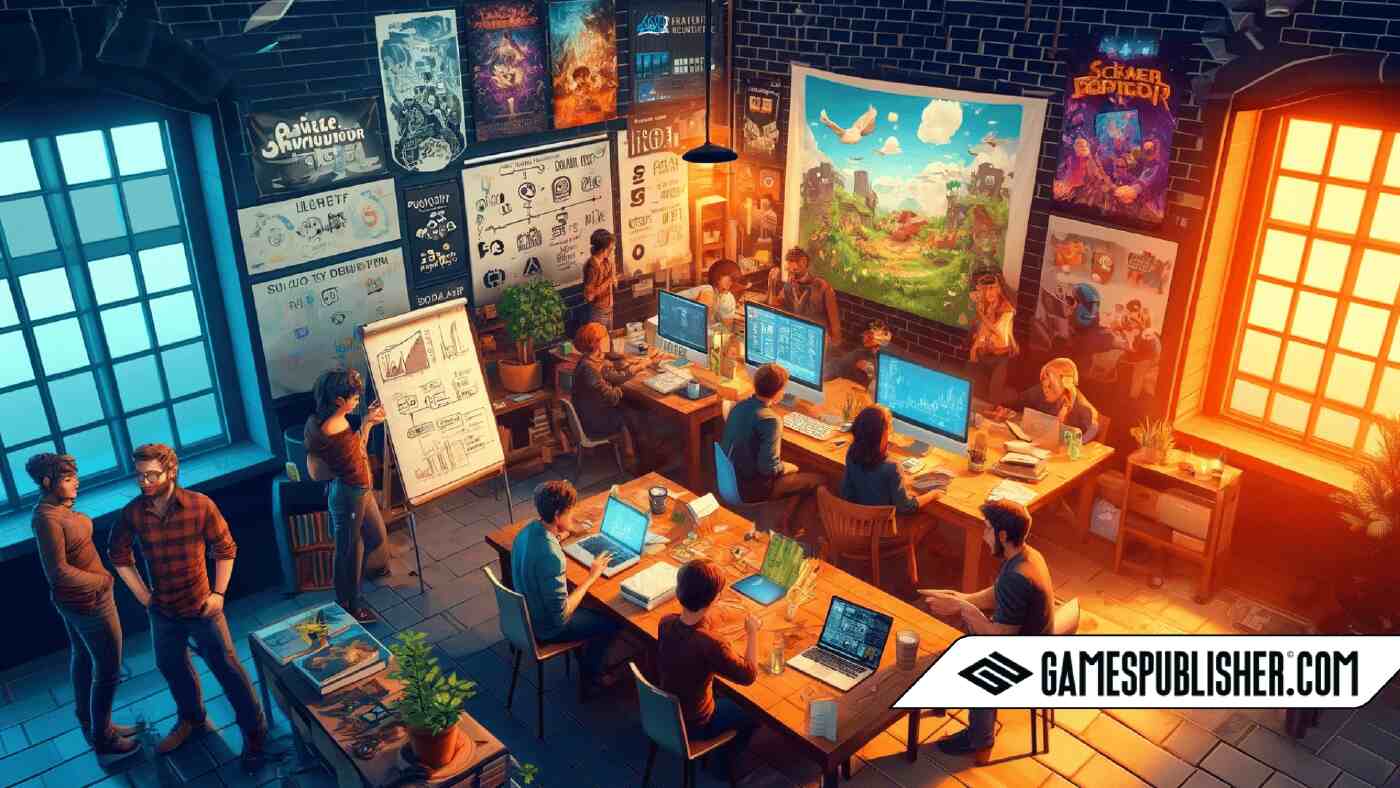Welcome to Gamespublisher.com! Today, we’re diving deep into the world of indie game development, a vibrant and challenging segment of the gaming industry.
The journey of indie developers is marked by unique hurdles and opportunities, especially in a landscape dominated by large video game publishers and established gaming platforms. As the indie game market continues to grow, understanding and navigating the challenges faced by indie developers has never been more crucial.
The rise of the indie game industry has transformed the gaming landscape, bringing fresh ideas and innovative gameplay to players worldwide. However, indie developers often grapple with significant challenges in game development and publishing.
These challenges, while daunting, also foster creativity and resilience. This article aims to explore the various hurdles indie developers face and offer practical strategies to overcome them, ensuring success in this highly competitive market.
Financial Constraints

Funding Difficulties
One of the most pressing issues for indie game developers is securing adequate funding. Unlike large studios backed by hefty budgets from video game publishers, indie developers often rely on personal savings, small loans, or alternative funding methods.
Common Funding Challenges:
- Limited Initial Capital: Many indie developers start with minimal financial resources, which can restrict the scope and quality of the game.
- Risk of Financial Loss: Without the backing of a major video game publisher, the financial risk rests entirely on the developers, who must navigate the market with limited safety nets.
Funding Options:
- Self-Funding: The most straightforward but risky option. Developers invest their own money into the project, which can strain personal finances.
- Crowdfunding: Platforms like Kickstarter and Indiegogo allow developers to pitch their ideas directly to potential players. Successful campaigns not only raise funds but also build an initial fanbase.
- Investors: Seeking investment from venture capitalists or angel investors can provide substantial funding, but may come with the expectation of significant returns and possible loss of creative control.
Budget Management
Efficient budget management is crucial for the sustainability of indie game projects. Mismanagement can lead to project delays or cancellations.
Tips for Managing a Limited Budget:
- Prioritize Expenses: Focus spending on critical areas such as core gameplay mechanics and essential development tools. Avoid unnecessary expenditures on non-essential features early in the project.
- Use Free and Affordable Tools: Leverage free or low-cost software for development, such as Unity or Unreal Engine, which offer robust tools for game creation.
Limited Resources
Small Teams
Indie game development teams are often small, which can be both a strength and a challenge. Small teams facilitate better communication and faster decision-making but can also struggle with workload and diverse skill requirements.
Maximizing Small Team Efficiency:
- Role Multiplicity: Team members often need to wear multiple hats. A programmer might also handle marketing, or a designer might take on project management.
- Strong Communication: Regular and clear communication is vital. Tools like Slack, Trello, and Discord can help maintain organization and ensure everyone is on the same page.
Tool Accessibility
Access to high-quality development tools can significantly impact the quality and efficiency of game development.
Affordable or Free Tools and Resources:
- Game Engines: Unity and Unreal Engine offer free versions with comprehensive features, making them accessible to indie developers.
- Art and Audio Assets: Websites like OpenGameArt and Freesound provide free assets that can enhance game development without straining the budget.
- Development Resources: Online tutorials, forums, and communities such as Reddit’s r/gamedev can offer valuable insights and support.
Marketing and Promotion

Building Awareness
Marketing is often an afterthought for indie developers, but it is crucial for a game’s success. With limited budgets, traditional advertising may be out of reach, necessitating creative and cost-effective strategies.
Strategies for Effective Marketing:
- Leverage Social Media: Platforms like X-Twitter, Instagram, and TikTok are powerful tools for reaching potential players. Regular updates, behind-the-scenes content, and engaging posts can build a loyal following.
- Community Engagement: Engaging with gaming communities on Reddit, Discord, and forums can generate buzz and foster a supportive fanbase.
Utilizing Social Media
Social media is a double-edged sword; it can amplify success or expose shortcomings. Effective use of social media requires strategy and consistency.
Tips for Leveraging Social Media:
- Content Variety: Mix up your posts with gameplay clips, development updates, and personal stories to keep your audience engaged.
- Regular Updates: Consistency is key. Regular posts keep your game in the minds of your followers.
- Engagement: Respond to comments, host Q&A sessions, and involve your audience in the development process through polls or beta testing opportunities.
Development Challenges
Time Management
Effective time management is critical to avoid burnout and ensure the project progresses smoothly.
Managing Development Schedules:
- Set Realistic Deadlines: Break the project into manageable milestones with realistic deadlines to maintain momentum without overwhelming the team.
- Use Project Management Tools: Tools like Trello, Asana, and Gantt charts can help track progress and keep the team focused on priorities.
Technical Issues
Technical challenges are inevitable in game development. From bugs to performance issues, these problems can derail progress and frustrate developers.
Overcoming Technical Challenges:
- Regular Testing: Implement regular testing cycles to identify and fix issues early. Use automated testing tools where possible.
- Seek External Help: Don’t hesitate to reach out to online communities or hire freelancers for specific technical challenges beyond your expertise.
Market Competition

Standing Out
The indie game market is fiercely competitive, with new games released daily. Standing out requires unique selling points and effective marketing.
Strategies to Stand Out:
- Unique Gameplay: Offer something different from existing games. Unique mechanics, storytelling, or art style can make your game memorable.
- Strong Visual Identity: A distinctive art style or compelling visual presentation can capture attention and set your game apart.
Player Expectations
Modern gamers have high expectations for quality and content, even from indie games. Meeting these expectations requires balancing ambition with practicality.
Meeting and Exceeding Expectations:
- Polished Gameplay: Ensure your game is bug-free and offers a smooth experience. Players are less forgiving of technical issues.
- Engaging Content: Provide meaningful content that keeps players engaged. Replayability and depth can enhance player satisfaction.
Distribution and Sales
Choosing Platforms
Selecting the right distribution platform is crucial for reaching your target audience and maximizing sales.
Pros and Cons of Popular Platforms:
- Steam: Offers a vast audience and robust features but has high competition and a significant revenue cut.
- itch.io: Indie-friendly with flexible pricing but a smaller audience.
- Epic Games Store: Provides a favorable revenue split and funding opportunities but has a less established user base compared to Steam.
Pricing Strategies
Setting the right price can impact sales volume and profitability.
Advice on Setting a Competitive Price:
- Research Competitors: Look at similar games to gauge market rates.
- Consider Value: Ensure the price reflects the content and quality of the game. Offering a fair price can enhance player satisfaction and encourage positive reviews.
Impact of Sales and Discounts:
- Sales Events: Participating in platform-wide sales events can boost visibility and attract new players.
- Discount Strategies: Offering occasional discounts can increase sales volume, especially for older games.
Conclusion
The journey of indie game development is fraught with challenges but also filled with opportunities. From financial constraints and limited resources to marketing hurdles and technical issues, indie developers must navigate a complex landscape.
However, with strategic planning, effective resource management, and a passion for innovation, indie developers can achieve success and make a lasting impact in the gaming industry.
Addressing these challenges head-on and leveraging available resources can turn obstacles into opportunities. Indie developers are encouraged to engage with communities, seek out funding options, and continually refine their craft to thrive in this competitive market.
By embracing the unique position they hold within the gaming industry, indie developers can continue to push the boundaries of creativity and bring diverse, compelling experiences to players around the world.
Loading survey...

